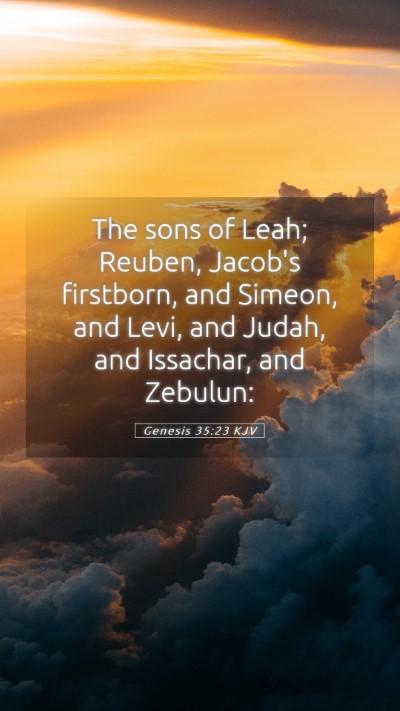Understanding Genesis 35:23
Genesis 35:23 states, "The sons of Leah; Reuben, Jacob's firstborn, and Simeon, and Levi, and Judah, and Issachar, and Zebulun."
This verse offers a genealogical insight into the lineage of the patriarch Jacob, particularly focusing on the descendants of Leah. The mention of Leah's sons indicates the fulfillment of God's promise to Jacob and the continuity of His covenant through the tribes of Israel.
Bible Verse Meanings and Interpretations
The recording of Jacob's sons serves several purposes in the narrative of Genesis and highlights the importance of family and lineage in biblical tradition.
- Lineage Significance: The line of inheritance and leadership is established through these names, emphasizing God's covenantal promise.
- Covenant Fulfillment: Each son represents not only Jacob's legacy but also God's plan for establishing Israel as a nation.
- Roles in Future Narratives: Each of the sons will play vital roles in the unfolding story of Israel, indicative of their traits and futures as seen in later chapters.
In-depth Commentary and Exegesis
Matthew Henry highlights that this verse provides a concise list of Leah’s sons, noting the importance of acknowledging the mothers as well as the fathers in the genealogy. He notes that Leah was not the favored wife yet bore the most sons, symbolizing how God can bless even those in less favored positions.
Albert Barnes emphasizes the relational dynamics within Jacob’s family, pointing out that these sons would serve pivotal roles among the tribes of Israel, reflecting God's providence and design in their lives.
Adam Clarke elaborates on the implications of the names of the sons, noting that each name carries a meaning that reflects Jacob’s story and God's providential care. The frustrations, hopes, and characteristics attributed to each son give the reader insight into the complexity of Jacob's family life.
Application of Genesis 35:23
Understanding the significance of this verse can help Bible study groups explore themes such as family relationships, divine promise, and the complexities of human emotions. The verse encourages believers to consider their own family legacies and how they reflect their faith.
This passage also invites deeper exploration into how God uses imperfect people and families to fulfill His purposes. This insight leads to a broader discussion about God’s sovereignty in our lives, despite familial dynamics.
Related Scriptures
- Genesis 49:3-4: Jacob's blessing of Reuben.
- Exodus 1:1-5: The listing of the sons of Jacob who went to Egypt.
- Numbers 1:20-22: The census of the sons of Israel.
- Deuteronomy 33:6-7: Moses’ blessing over the tribes, including Levi.
- Matthew 1:2-3: The genealogy of Jesus mentioning Judah.
Bible Study Insights and Resources
For those engaging in Bible study or online Bible study, Genesis 35:23 can be a focal point for discussions on familial roles within the biblical narrative. Consider utilizing resources such as:
- Bible study guides that delve into genealogies.
- Online Bible study tools that offer comparative insights on similar genealogies.
- Courses focused on understanding Old Testament figures and their significance.
Conclusion
Analyzing Genesis 35:23 provides nuanced perspectives on biblical history, covenant theology, and familial structures. It encourages believers to reflect on their own family dynamics and to trust in God's overarching plan throughout biblical history. Whether through personal study or in a community setting, this verse can lead to profound discussions on the role of family in our faith journeys.


